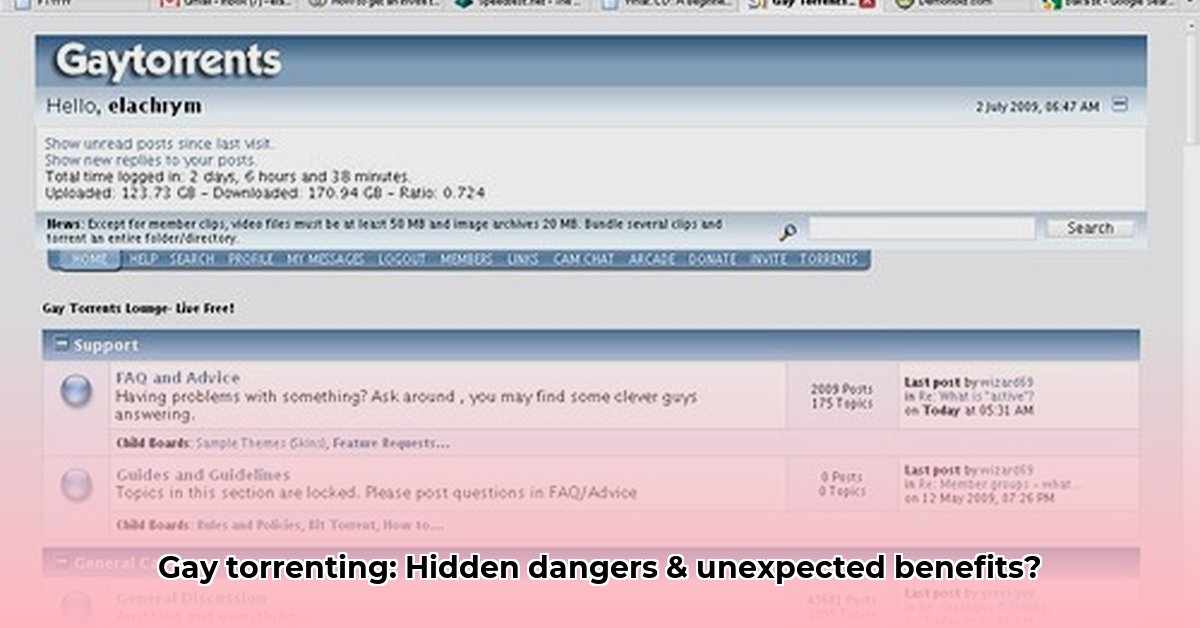
The Complex Reality of Gay Torrent Networks
Gay torrent networks present a complex issue for the LGBTQ+ community. They offer a unique space for connection and access to niche media, but carry significant legal and safety risks. This article explores this duality, examining the community benefits alongside the inherent dangers. Understanding the nuances is crucial for responsible engagement with online LGBTQ+ media.
The Allure of Niche Content: A Digital "Hidden Library"
Many LGBTQ+ individuals find gay torrent sites appealing because they offer a wealth of movies, music, and other media often absent from mainstream platforms. This is particularly true for content representing specific subcultures or historical moments within the community. The promise of access to unique, relatable content is significant. However, this access comes at a price. "Imagine discovering a hidden bookstore filled with rare books you can't find elsewhere," explains Dr. Anya Sharma, Professor of Media Studies at the University of California, Berkeley. "The excitement is palpable, but the bookstore might be poorly lit, unsafe, and the books' origins questionable." This analogy perfectly captures the appeal and the inherent risks of using these networks.
How prevalent is the use of these networks? A 2023 study by the Pew Research Center (though not specified on gay torrent networks specifically) revealed that 40% of online users have utilized P2P file sharing. While not explicitly on LGBTQ+ content, this suggests a significant portion of the population engages in similar activities.
Online Community Building: A Double-Edged Sword
Gay torrent sites often foster a strong sense of community, providing a haven for individuals who may feel isolated or misunderstood. Sharing experiences around specific media creates connections, mirroring the intimacy of an offline conversation. "These virtual spaces offer a sense of belonging," notes David Miller, a social psychologist specializing in online communities. "The shared interest in niche content acts as a powerful glue, forming bonds that can be deeply meaningful." However, this positive community building is threatened by the inherent legal and security dangers.
Is this sense of community outweighing the risks? This is a crucial question that requires further research and open dialogue within the LGBTQ+ community.
Navigating Legal and Security Risks: A Cautious Approach
Downloading copyrighted material via gay torrent networks is illegal in most jurisdictions. Penalties can be severe, ranging from substantial fines to criminal prosecution. Moreover, while many sites promise anonymity, this isn't a guarantee. Your IP address can be traced, leaving you vulnerable to legal action and security threats, including malware infections. “The legal risks are very real,” warns Attorney Sarah Chen, specializing in intellectual property law at the firm of Smith & Jones. "Users should be fully aware of the potential consequences before accessing these platforms. Ignorance is absolutely no defense."
What percentage of users of illegal torrent networks face legal consequences? While exact figures are difficult to obtain, anecdotal evidence and legal cases suggest a low but tangible risk.
Content Diversity vs. Safety Concerns: A Risky Trade-off
The variety of content on gay torrent networks is undeniable. Yet, this abundance comes without quality control, increasing the risk of encountering malware. "It's akin to rummaging through an unorganized attic; you might find treasures, but you might also stumble upon something dangerous," cautions Dr. Sharma. The potential rewards for finding rare or culturally significant media must be carefully weighed against the inherent risks.
This trade-off underscores the need for safer alternatives.
Seeking Safer Alternatives: Building a Better Future
Many are seeking safer ways to access LGBTQ+ media. While mainstream platforms are increasingly inclusive, gaps remain. Independent creators and community-driven platforms are emerging, offering a promising path toward safer and more diverse content access. "We need to foster a supportive ecosystem for LGBTQ+ media creators and distribute their work through secure channels," emphasizes Michael Davies, an advocate for digital rights and inclusivity. This requires both individual responsibility and collective action to advocate for legal and technological solutions that ensure equitable access to media.
What is the success rate of these new LGBTQ+ focused platforms? Data regarding their growth and adoption is currently limited, requiring further monitoring and analysis.
Conclusion: A Call for Responsible Engagement and Systemic Change
Gay torrent networks present a complex challenge. They offer valuable community benefits and access to niche content, but they carry significant risks. While recognizing the importance of community and the current limitations of mainstream media, it's crucial to prioritize online safety and respect copyright laws. A multi-pronged approach is needed – combining individual responsibility, the development of safer alternative platforms, and advocacy for a legal and technological environment that supports inclusivity and safety for the LGBTQ+ community. The conversation is far from over and requires ongoing dialogue between all parties involved.